Note from the Editors: The website of the Global Network of Psychologists for Human Rights (GNPHR) contains articles, events and news about the domain where psychology and human rights intersect. The information presented in this Bulletin is gathered from many sources and reflects many opinions. The publication of information does not imply that the GNPHR as a network, the GNPHR Steering Committee as a committee, or the individual subscribers share the views and beliefs expressed. The goal of the many opinions expressed is to stimulate reflection, discussion, and informed dialogue.

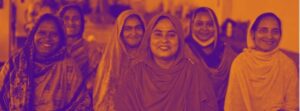
SPECIAL FOCUS is on the International Women’s Day,
which was celebrated March 11, 2024
https://www.internationalwomensday.com/
The campaign theme for International Women’s Day 2024 is Inspire Inclusion. When we inspire others to understand and value women’s inclusion, we forge a better world. And when women themselves are inspired to be included, there’s a sense of belonging, relevance, and empowerment.
Table of Contents
SPECIAL FOCUS: International Women’s Day
SPECIAL SECTION
 SPECIAL FOCUS: International Women’s Day
SPECIAL FOCUS: International Women’s Day
Background
UN Headquarters, 18 January 1950. https://www.un.org/en/observances/womens-day/background
International Women’s Day is celebrated in many countries around the world. It is a day when women are recognized for their achievements without regard to divisions, whether national, ethnic, linguistic, cultural, economic or political. The growing international women’s movement, which has been strengthened by four global United Nations women’s conferences, has helped make the commemoration a rallying point to build support for women’s rights and participation in the political and economic arenas.
First key years of the movement
Officially recognized by the United Nations in 1977, International Women’s Day first emerged from the activities of labour movements at the turn of the twentieth century in North America and across Europe: The first National Woman’s Day was observed in the United States on 28 February. The Socialist Party of America designated this day in honour of the 1908 garment workers’ strike in New York, where women protested against working conditions.
But the first milestone in US was much earlier – in 1848. Indignant over women being barred from speaking at an anti-slavery convention, Americans Elizabeth Cady Stanton and Lucretia Mott congregate a few hundred people at their nation’s first women’s rights convention in New York. Together they demand civil, social, political and religious rights for women in a Declaration of Sentiments and Resolutions. A movement is born.
 Tracking progress: Commission on the Status of Women. June 21, 1946
Tracking progress: Commission on the Status of Women. June 21, 1946
A functional commission of the United Nations Economic and Social Council (ECOSOC), the Commission on the Status of Women (CSW) is established as the first global intergovernmental body exclusively dedicated to the promotion of gender equality and the empowerment of women. Instrumental in monitoring the status of women’s rights worldwide and shaping global standards on gender equality, the Commission brings together Member States, civil society organizations and UN entities to assess gaps and evaluate progress on an annual basis. In the Commission, Member States agree on actions to accelerate the achievement of women’s rights and empowerment.
The golden standard: Women’s Bill of Rights. December 18, 1979
In 1979, The UN General Assembly adopts the Convention on the Elimination of All Forms of Discrimination against Women (CEDAW). Often referred to as the “Women’s Bill of Rights”, CEDAW is the most comprehensive international instrument to protect the human rights of women. It defines the meaning of discrimination against women and establishes legal obligations for countries that are parties to it (i.e. States Parties) to end such discrimination. More specifically, the Convention requires States Parties to eliminate discrimination against women in the public as well as the private sphere, including the family, and aims to achieve substantive equality between women and men — not just in laws, but also in reality on the ground. As of 2015 with 189 States Parties, it is the second most ratified UN human rights treaty after the Convention on the Rights of the Child.
Enough is enough: End violence against women. December 20, 1993
The World Conference on Human Rights in Vienna, June 1993, takes historic steps to protect women’s rights by recognizing violence against women as a human rights violation and calls for measures towards eliminating such forms of violence
Seeking justice: International Criminal Court. July 17, 1998
After years of negotiations, the International Criminal Court (ICC) becomes a reality when 120 Member States vote in favour of the Rome Statute. The ICC, based in The Hague, Netherlands, is a permanent international court established to try the most serious war crimes, crimes against humanity, and genocide. The court’s substantive jurisdiction over sexual and gender-based violence and gender-based persecution, its gender-sensitive rules of procedure and evidence, and its strong emphasis on gender balance, have been hailed as important steps forward for women’s rights and gender equality in the fight against impunity.
October 31, 2000. A landmark resolution: Women, peace and security
A victory: UN Women is born. July 2, 2010
Taking a historic step in July 2010, the UN General Assembly creates the United Nations Entity for Gender Equality and the Empowerment of Women (UN Women) to accelerate progress on meeting the needs of women and girls worldwide. The move comes as part of a UN reform agenda by merging and building on the important work of four previously distinct parts of the UN system exclusively dedicated to empowering women. Initially lead by the current President of Chile Michelle Bachelet, the organization today (2015) stands as a dynamic champion for women and girls worldwide under the leadership of Phumzile Mlambo-Ngcuka of South Africa.
July 12, 2013 Malala: “We cannot all succeed when half of us are held back”
 Celebrating Women: Breaking Shackles to Reach True Potential
Celebrating Women: Breaking Shackles to Reach True Potential
BLOG by Amina Muazzam, Professor at Department of Applied Psychology, Lahore College for Women University, Pakistan.
Related Articles
 This International Women’s Day, 8 March 2024, join the United Nations in celebrating under the theme Invest in women: Accelerate progress. The world is facing many crises, ranging from geopolitical conflicts to soaring poverty levels and the escalating impacts of climate change. These challenges can only be addressed by solutions that empower women. By investing in women, we can spark change and speed the transition towards a healthier, safer, and more equal world for all.
This International Women’s Day, 8 March 2024, join the United Nations in celebrating under the theme Invest in women: Accelerate progress. The world is facing many crises, ranging from geopolitical conflicts to soaring poverty levels and the escalating impacts of climate change. These challenges can only be addressed by solutions that empower women. By investing in women, we can spark change and speed the transition towards a healthier, safer, and more equal world for all.
If current trends continue, more than 342 million women and girls could be living extreme poverty by 2030. To ensure women’s needs and priorities are considered, governments must prioritize gender-responsive financing and increase public spending on essential services and social protection. Policymakers must also value, recognize, and account for the vital contribution women make to economies worldwide through paid and unpaid care work. Women spend around three times more time on unpaid care work than men and if these activities were assigned a monetary value they would account for more than 40 per cent of GDP.
International women’s day 2024: paving the path to equality in 2024 and beyond.
Markets Insider, March 11, 2024
Through this year’s International Women’s Day theme, “Inspire Inclusion”, we are challenged to take concrete steps to promote inclusion. As part of this community, Taylor’s University strives to contribute back to the people around us through meaningful and long-lasting change. The driving forces behind these impactful changes are the women in Taylor’s who are working to dismantle barriers to inclusion and create a more just and equitable society for all.
A Hands-Up Approach to Change
Professor Anindita Dasgupta grew up in an environment where she witnessed the annual floods that devastated the homes and livelihoods of impoverished communities living along the riverbanks. These experiences fuelled a deep sense of empathy and a desire to make a positive impact. Upon moving to Malaysia, Professor Dasgupta’s perspective expanded as she observed different forms of hardship and struggle faced by socio-economically marginalised communities here, women especially. This inspired her to kick-start and lead the Ibu.Niaga project at Taylor’s University.
Closing The Gap in the Architecture Industry
In the field of architecture, Associate Professor Dr Veronica Ng Foong Peng believes in beating a path for not just yourself, but for others around you as well.
Empowerment With the Power of Words
Hema Letchamanan believes in literacy as the cornerstone for women’s empowerment, encompassing language, digital, and financial realms.
 Cambridge Press provides Access in Celebration of International Women’s Day
Cambridge Press provides Access in Celebration of International Women’s Day
In celebration of International Women’s Day 2024 on 8 March we have made a collection of Cambridge journal articles and book chapters free to access throughout March. The content is authored by and about women celebrating the theme Invest in women: Accelerate progress. Achieving gender equality and women’s well-being in all aspects of life is more crucial than ever if we want to create prosperous economies and a healthy planet. However, we are facing a key challenge: the alarming $360 billion annual deficit in gender-equality measures by 2030. This International Women’s Day, let’s unite to transform challenges into opportunities and shape a better future for all! IWD belongs to everyone, everywhere. Inclusion means all IWD action is valid.
GNPHR NEWS AND EVENTS
Call for Students and Early Career Psychologists: 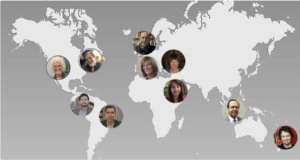 Nominations welcomed for the GNPHR Steering Committee
Nominations welcomed for the GNPHR Steering Committee
Are you a student or young professional (under 35 years of age) interested in joining the GNPHR Steering Committee? The GNPHR invites nominations (including self-nominations).
The GNPHR Steering Committee terms of reference broadly define the roles of all members to take responsibility for one of the following:
- Developing bibliographic materials and content on a specific human rights/psychology area;
- Spearheading aspecific project (e.g. survey of human rights reporting mechanisms; survey of educational programs in psychology/human rights, etc);
- Taking on a specific function: e,.g., organizing a newsletter; soliciting commentary or newsletter blogs; seeking grant possibilities; outreach to general human rights organizations; outreach to psychology organizations
- Consultation: Working in collaboration with other organisations where there is a specific issue or liaising with other organisations that are focussed on younger people, psychology, and human rights.
In addition, from time-to-time, short-term subgroups work on specific projects (e.g. Town Hall meeting; white paper).
Click here for nomination form and materials
GNPHR Announces New Award
 Education in Human Rights & Psychology Recognition Award.
Education in Human Rights & Psychology Recognition Award.
This award acknowledges outstanding educational materials for human rights education for psychologists. See more and submit a nomination here: Education in Human Rights Award
Upcoming Webinar
 Human Rights and Psychology – with George Drazenovich
Human Rights and Psychology – with George Drazenovich
CONTENT AREAS AND NEWS
General
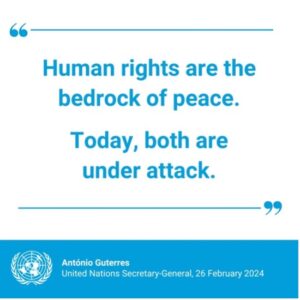
Jean Maria Arrigo, Who Exposed Psychologists’ Ties to Torture, Dies at 79.
Trip Gabriel, NY Times
Jean Maria Arrigo, a psychologist who exposed efforts by the American Psychological Association to obscure the role of psychologists in coercive interrogations of terror suspects in the aftermath of the Sept. 11, 2001, attacks, died on Feb. 24 at her home in Alpine, Calif. She was 79.
Risking ostracism by her colleagues, she fought against the use of psychologists in coercive interrogations by the military and the C.I.A.
Children/Youth
A global call for adolescent intimate violence prevention
Savannah L Johnson, Jennifer Mootz et al., The Lancet Comment, vol. 11, issue 4, p. 238-239, April 2024.
Intimate partner violence (IPV), broadly defined as behaviours within a current or previous romantic relationship that cause physical, psychological, or sexual harm, begins early in dating relationships. By age 15–19 years, 24% of adolescent girls have already experienced IPV. Although there are no data on the global prevalence findings among adolescent boys, estimates suggest they too are at risk for victimisation and perpetration.
Despite the emergence of IPV during adolescence, little has been done to target patterns of violence during this developmental period. Adolescence is the ideal time for prevention efforts as a period of “transformative change”, when health and relationship patterns are being established. IPV prevention at this stage can solidify healthy relationship patterns that have benefits beyond the individual, with the potential for healthy intergenerational relationships over time. Furthermore, compared with prevention, intervention is more difficult after IPV begins and the risk of serious consequences—including mortality—emerges.
In this Comment, we lay out key actions for preventing IPV and potential implementation pathways.
Displaced/Migrants/Refugees/Stateless
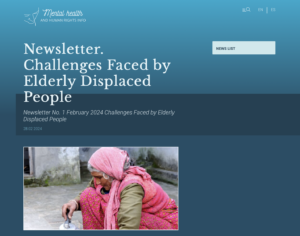 Newsletter No. 1. Challenges Faced by Elderly Displaced People. HHRI, 28 February 2024.
Newsletter No. 1. Challenges Faced by Elderly Displaced People. HHRI, 28 February 2024.
Challenges Faced by Elderly Displaced People.
Human Rights Education
HREA, Search by Human Rights theme
As a reminder of the essential role that education can play in disrupting discrimination, we recognize International Day for the Elimination of Racism on March 21. The 2024 theme is “A Decade of Recognition, Justice, and Development: Implementation of the International Decade for People of African Descent”.
In HREA’s resource centre, you will find educational supports for addressing anti-racism (54) and freedom from discrimination (222). Feel free to review the HREA learning resources, as well as others that may be of interest in our Online Resource Center.
Inclusion, Exclusion, Racism
The Colonial History of Systemic Racism: Insights for Psychological Science
Kevin R. Tarlow, Sage, Perspectives on Psychological Science, 2024.
The psychological study of systemic racism can benefit from the converging insights of “Black Marxism” and development economics, which illustrate how modern systemic racism is rooted in the political and economic institutions established during the historical period of European colonization. This article explores how these insights can be used to study systemic racism and challenge scientific racism in psychology by rethinking traditional research paradigms to incorporate the histories of race, class, and capitalism. Antiracism strategies that make use of these histories are also discussed, which include disrupting the psychological processes that sustain racist systems.
The ‘Colorblindness’ Trap. How a civil rights ideal got hijacked
Nikole Hannah-Jones, March 13, 2024, NY Times
Anthony K. Wutoh, the provost of Howard University, was sitting at his desk last July when his phone rang. It was the new dean of the College of Medicine, and she was worried. She had received a letter from a conservative law group called the Liberty Justice Center. The letter warned that in the wake of the Supreme Court’s decision striking down affirmative action in college admissions, the school “must cease” any practices or policies that included a “racial component” and said it was notifying medical schools across the country that they must eliminate “racial discrimination” in their admissions. If Howard refused to comply, the letter threatened, the organization would sue.
Those who believe in American democracy, who want equality, must no longer allow those who have undermined the idea of colorblindness to define the terms. Working toward racial justice is not just the moral thing to do, but it may also be the only means of preserving our democracy. Race-based affirmative action has died. The fight for racial justice need not. It cannot.
LGBTQI+, Gender Rights
New legislation threatens prison sentences of up to five years for ‘wilful promotion, sponsorship or support of LGBTQ+ activities’.
Staff and agencies in Accra, THE GUARDIAN, Wed 28 Feb 2024.
Ghana’s parliament has passed legislation that intensifies a crackdown on the rights of LGBTQ people and those promoting lesbian, gay or other non-conventional sexual or gender identities in the West African country. The bill still has to be validated by the president before becoming law, which observers believe is unlikely before a general election in December.
Commonly referred to as the anti-gay bill, the sweeping legislation received sponsorship from a coalition comprising Christian, Muslim and Ghanaian traditional leaders, and passed through an unopposed voice vote.
While discrimination against LGBTQ people is common, no one has ever been prosecuted under the colonial-era law. UN rights chief Volker Türk condemned the passing of the bill. A human rights coalition known as the Big 18, an umbrella group of lawyers and activists in Ghana, has also criticised the bill. Members of Ghana’s LGBTQ community are worried about the implications of the bill.
Alex Kofi Donkor, the founder and director of the organisation LGBT+ Rights Ghana, said “the passing of this bill will further marginalise and endanger LGBTQ individuals in Ghana.
“It not only legalises discrimination but also fosters an environment of fear and persecution,” he said. Gay sex has been decriminalised in only a handful of countries: Cape Verde, Gabon, Guinea-Bissau, Lesotho, Mozambique and Seychelles, according to the ILGA.
Mental Health and Human Rights
Severe mental illness in the UK: a crisis of compassion. Editorial, The Lancet, Vol. 403, issue 10427, p.587, February 17, 2024.
If a society is to be judged on how it treats its most vulnerable, the UK faces some uncomfortable home-truths. Despite a raft of mental health awareness campaigns, pervasive discriminatory attitudes regarding severe mental illness remain.
Inflammatory narratives around the risk that people with severe mental illness pose to the public are misleading. Patients are more likely to be victims of violence than perpetrators, and homicides are extremely rare. So rare, in fact, that predicting violence becomes problematic—evidence for the predictive performance of violence risk assessment instruments is limited. Some UK mental health legislation not only lacks evidence of effectiveness—it is demonstrably ineffective. Community treatment orders, introduced in England and Wales as part of the Mental Health Act 2007, facilitate compulsory community treatment of patients.
Peace / Violence and War
Middle East
Psychological first aid.
HHRI, 26 October 2023.
The situation in Middle East has devastating consequences for the mental health of the affected people; consequences that might reverberate for years to come.
The tragic and ongoing armed conflict between Israel and Hamas is affecting millions of people in the whole world. Our deepest sympathy is directed to the victims of the severe and unacceptable blockade and bombardment of Gaza and Palestinian civilians, and to the victims of the gruesome attack on civilians in Israel by Hamas. The lives and livelihoods of all these victims are destroyed and endangered, the conflict seems to be one that grows more violent and desperate every day, and prospects for hope and lives in peace seem very far away. And the main challenge for them right now seems to be survival! At the same time, we know that there are so many people around the world who live with this conflict every single day, who have done it for years, and of course even more, right now. And this is so, despite the fact that they themselves may live in peace and security.
The information in the following is compiled or developed for helpers, volunteers, and professionals engaged in emergency work and support to persons exposed to war trauma, separation, and loss:
- Psychological First Aid
- For helpers working with survivors of sexual violence
- Children in armed conflict resources
We are longing for peace in the Middle East with justice and human rights for all. Sincerely, The MHHRI team
Famine in Gaza is imminent, with immediate and long-term health consequences. Statement WHO,
18 March 2024, Cairo/Geneva/Jerusalem
The latest analysis from the Integrated Food Security Phase Classification (IPC) partnership released today warns that the situation in Gaza is catastrophic, with northern Gaza facing imminent famine and the rest of the Strip at risk as well.
“The IPC announcement reflects the dire situation that the people of Gaza are facing,” said WHO Director-General Dr Tedros Adhanom Ghebreyesus. “Before this crisis, there was enough food in Gaza to feed the population. Malnutrition was a rare occurrence. Now, people are dying, and many more are sick. Over a million people are expected to face catastrophic hunger unless significantly more food is allowed to enter Gaza.”
Before the recent months’ hostilities, 0.8% of children under 5 years of age were acutely malnourished. Today’s report shows that as of February in the northern governorates, that figure is between 12.4 and 16.5%.
Fasting for Ramadan While Gaza Goes Hungry.
How do you celebrate the holy month when you fear the suffering may not end? Zaina Arafat, The NEW YORKER, March 11, 2024
On the evening of February 28th, thousands of people gathered on Al-Rashid Street, in Gaza City, in hopes that a convoy of aid trucks would bring them desperately needed food. The trucks arrived early the next morning, at around a quarter to five. When a large crowd encircled them in an effort to obtain food, Israeli forces, who were standing by, opened fire. More than a hundred people were killed, and hundreds more were injured. Later, the Israeli Army said that its troops had felt threatened, and that some Palestinians died in a stampede. The day has become known as the “flour massacre.”
The ethics of psychiatric management in times of disaster and war: experiences from Israel after the Oct 7 attack.
Rael D. Strous and Yaakov Monovich, The Lancet Psychiatry, Volume 11, Issue 4, p. 242-244, April 2024.
In times of disaster and war, psychiatrists are often called upon to facilitate recovery of individuals and communities while applying their unique expertise and knowledge.1 By its nature, clinical practice is an ethical minefield during times of war. We seek to assess how principles of distributive (defining who gets what), procedural (establishing how people should be treated properly), and restorative (rebuilding appropriate relationships and interactions) justice can be respected and maintained in times of crisis. We necessarily write from an Israeli perspective, and we acknowledge the suffering and psychiatric needs of the people of Gaza, to whom the ethical dilemmas will also apply.
While the ethical dilemmas presenting in this unique psychiatric treatment setting in Israel after the Oct 7 attack are interesting and challenging, the guiding principles of medical ethics inform a balanced response and protect the best interests of the patients and the community.
U.N. Team Finds Grounds to Support Reports of Sexual Violence in Hamas Attack.
Farnaz Fassihi andIsabel Kershner, March 4, 2024, NY Times.
A United Nations report released on Monday found signs that sexual violence was committed in multiple locations during the Hamas-led Oct. 7 attacks on Israel and said that some hostages being held in the Gaza Strip had also been subjected to rape and sexual torture.
From late January to early February, the United Nations deployed a team of experts to Israel and the West Bank led by Pramila Patten, the secretary general’s special representative on sexual violence in conflict. In their full report, the experts said they had found “reasonable grounds” to believe that sexual violence occurred during the Hamas-led incursion into Israel, including rape and gang rape in at least three locations: the Nova music festival site and the area around it, as well as Road 232 and Kibbutz Re’im. The United Nations experts also said that they had “clear and convincing information” that hostages seized in Israel on Oct. 7 had been sexually abused in Gaza, and that they had looked into reports of abuse of Palestinians in Israeli detention.
See the Report here
The Israeli Settlers Attacking Their Palestinian Neighbors.
Shane Bauer, The New Yorker, February 26. 2024. With the world’s focus on Gaza, settlers have used wartime chaos as cover for violence and dispossession.
The first time that Ma’amar witnessed settler violence was in 1996. It was in the wake of the first election to Prime Minister of Benjamin Netanyahu, who was intent on blocking any progress toward a two-state solution. Shilo took even more land from Qaryut, to make a vineyard. The village staged a protest, which Ma’amar filmed. The Army and settlers rushed in, firing shots into the air, and settlers beat people and tried to take cameras from anyone documenting the scene. An Israeli court ruled that the land should be returned to Qaryut, but Ma’amar said that settlers continued to attack people who approached, so the land was effectively lost.
In the years that followed, settlers put up tents, then mobile homes, on hilltops. Settlements are mostly considered illegal under international law, but these outposts were illegal even under Israeli law. Still, the government did little to dissuade the hilltop settlers, who viewed themselves as pioneers. The outposts were quickly connected to larger settlements by water systems, power lines, and paved roads. In time, a corridor of settlement took shape, slicing across the West Bank until the map looked more and more like the one envisioned by many settlers and political leaders, in which Palestinians would live in small and disconnected territories within an expanded Israel. Qaryut sat right in the corridor’s path; there were now eight official settlements and at least eleven smaller outposts in a five-mile radius of the village. “Without international and legal pressure on the Israelis, Qaryut will disappear,” Ma’amar said.
Ukraine
A short history of Russia and Ukraine.
Seven maps that illustrate Vladimir Putin’s distortion of history. Jan 29, 2024, THE ECONOMIST.
In july 2021 Vladimir Putin published an essay with arguments he would later use to justify Russia’s invasion of Ukraine. It raced through 1,000 years to argue that Russians and Ukrainians are one people, cruelly divided by “external forces” with an “anti-Russian” agenda. Mr Putin’s war is supposed to fix that. There is truth in his claim that Ukraine and Russia are close kin, as the following maps demonstrate. What is nonsense is the assertion that their separation into two countries is the result of some external plot, imposed on the Ukrainians against their wishes.
Women
Gambia Moves Toward Overturning Landmark Ban on Female Genital Cutting.
Ruth Maclean, Reporting from Dakar, Senegal, NY Times, March 18, 2024.
Lawmakers in the West African country voted to advance a bill repealing a 2015 ban. If it passes the final round of voting, Gambia will become the first nation to roll back protections against the practice.
Of the 47 members of the Gambia National Assembly present on Monday, 42 voted to send a bill to overturn the ban onward to a committee for consideration before a final vote. Human rights experts, lawyers and women’s and girls’ rights campaigners say that overturning the ban would undo decades of work to end female genital cutting, a centuries-old ritual tied up in ideas of sexual purity, obedience and control.
If the bill passes the final stages, the small West African nation of Gambia will become the first nation globally to roll back protections against cutting.
French Lawmakers Enshrine Access to Abortion in Constitution.
Legislators passed an amendment giving women the “guaranteed freedom” to end their pregnancies, which experts called a global first. Catherine Porter, NY Times, March 4, 2024.
French legislators on Monday voted to explicitly enshrine access to abortion in the Constitution, making their country the first in the world to do so. Acutely aware that they were breaking historical ground from the grand assembly room inside Versailles Palace, the politicians delivered impassioned speeches about women’s rights around the world, paid homage to the courageous Frenchwomen who had fought for abortion rights when it was illegal and leaped up time and again to offer standing ovations. “We are sending the message to all women: Your body belongs to you and no one has the right to control it in your stead,” Prime Minister Gabriel Attal said, before the gathered lawmakers voted 780-72 for the amendment. The amendment declares abortion to be a “guaranteed freedom,” overseen by Parliament’s laws. That means future governments will not be able to “drastically modify” the current laws funding abortion for women who seek one, up to 14 weeks into their pregnancies, according to the French justice minister, Éric Dupond-Moretti.
Trapped in Oman–BBC Africa Eye Documentary–17 March 2024
“We want our people back.” “How can you buy someone else’s freedom? ” Two million women are domestic workers in the Gulf region.
Just a short update to let you know that the efforts continue to spotlight the fight against human trafficking for this year’s Global Integrity Day (GID)–9 June 2024. Thank you to those who have responded so far about organising a webinar or event around this special day or during this year (which we could feature on the GID website). We are now in the three month countdown!
A second update is that we continue to add a steady stream of materials to the GID website. These materials include events and webinars, written materials and reports and organisations and networks— preventing, fighting, and prosecuting human trafficking as well as helping and caring for victims. Have a look! here is an example: True Freedom–Global Course Addressing Modern Slavery. The Clewer Initiative and the World Council of Churches (February-March 2024). 50 pages of facts and reflections for advocacy and action for individuals and groups–organised into six parts.
Human trafficking is not getting better. It victimizes an estimated 25 million children and adults, with an estimated 80% in forced labour and 20% in sex trafficking. Please get involved in this year’s GID and the fight against human trafficking!
PUBLICATIONS
Società dei consumi e sostenibilità / Consumption society and sustainability /Una prospettiva psicoculturale / A psycho-cultural perspective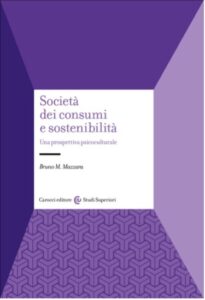
Bruno M. Mazzara, Carocci editore, Aprile 2023.
The sustainability of our lifestyle and the development model that underlies it is a topic that urgently needs to be reflected upon, in the face of increasingly evident signs of suffering on the planet that hosts us. The book explores the origins and characteristics of consumer culture by examining, also from a historical perspective, the interconnections between social, economic and political dynamics and psychological ones.
 From Liberty to Equality
From Liberty to Equality
What are the limits of religious freedom? What should be done when that freedom clashes with the rights and interests of others? For instance, are religious schools allowed to discriminate based on sexual orientation when hiring teachers? How has thinking about these questions evolved in the Netherlands, and within Christian political parties? In this PhD thesis, Lars Nickolson analyses the debate surrounding freedom of religion, both within the political and jurisprudential arena as well as within the corridors of Dutch parliament. He sheds light on a fundamental tension between two perspectives: freedom and equality.
 12 Emerging Trends in Psychology for 2024.
12 Emerging Trends in Psychology for 2024.
APA
In 2024, psychology will play a major role in pointing the way toward a healthier, more just society. With rampant misinformation and a presidential election on the line, we all have a basic duty to engage, using the tools of psychological science to counter falsehoods.
Psychologists are also working to guide the development of generative AI, the outlook for higher education, women’s and LGBTQ individuals’ rights, racial equity, access to mental health care, workplace satisfaction, addiction rates, and much more.
OPPORTUNITIES
Rubin/Flores Student Research Award (human rights focus) – Nominations Open
Division 52, International Psychology, offers Rubin/Flores Student Research Award which seeks to inspire students to explore and to think critically about the intersection of psychology and human rights. This award recognizes the contributions of undergraduate and graduate students in psychology throughout the world to advance human rights globally. This award has been established to encourage students to integrate human rights into science, application and intervention models in the field of psychology.
Nominations deadline is APRIL 1, 2024
Nominations should be submitted HERE. Self-nominations are welcone.
Please direct any questions to the chair of this award Dr. Erinn Cameron ecameron@email.fielding.edu
UPCOMING EVENTS
International Association for Human Rights Education Conference London, Friday 19 April 2024
We warmly invite you to join us in London for our 2024 conference. The IAHRE/ HRE conference is a meeting place for human rights education schools and practitioners and all working for social justice through education. We will be joined from speakers from Japan, South Africa, USA and many European countries. Readers of HRER are especially welcome. The full programme is now published (below) with details of our keynote speakers, Prof Sonia Livingstone and Professor Farzana Sahin. Early bird rates are available. Discounts are also available for IAHRE members. Visit https://global-iahre.org/ Do share this information in your networks and on social media.
We invite you to join us in London on 19 April 2024. Registration is now open.

SAR’s Student Advocacy Seminars provide university and college students with the opportunity to develop human rights research and advocacy skills through direct engagement on behalf of threatened members of the global higher education community in cooperation with SAR’s Academic Freedom Monitoring Project and Scholars in Prison Project. Read the Student Advocacy Handbook to learn more.
To learn more, contact SAR’s Student Advocacy Seminar Coordinator Adam Braver at adam.braver@nyu.edu
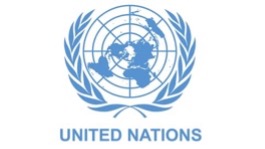 You can follow the meetings of the Human Rights Council by the United Nations Web TV:
You can follow the meetings of the Human Rights Council by the United Nations Web TV: CONTACTS: Published by the Global Network of Psychologists for Human Rights – www.humanrightspsychology.org
Disclaimer: The website of the Global Network of Psychologists for Human Rights (GNPHR) contains articles, events and news about the domain where psychology and human rights intersect. The information presented in this Bulletin, does not imply that the GNPHR shares the views and beliefs in the articles.
- @GNPHR1
- How to get involved – read how you can contribute to the global network
- Consider contributing a Blog/Commentary
- News and Bulletins from the GNPHR – Subscribe to GNPHR
- Email addresses:
Ways to Participate in Global Network Activities
- Share Your Experiences and Examples
One of the best ways to illustrate the intersection of psychology and human rights is through example. We are looking for examples of your encounters with human rights issues in your professional life. You might describe a time when you protected (or failed to protect) human rights, or advocated for what you saw as a human rights issue. The events might be in your clinical, research, academic, applied, or volunteer work. Please send your narrative / story (500-1000 words) to Marlena Plavšić (marlena_plavsic@hotmail.com). We will compile these for publication in the GNPHR Bulletin and on the website. Please also indicate if you would like your stories to remain anonymous. - Share your Expertise and Opinions
We invite you to contribute a blog or opinion piece on general human rights issues; human rights education or strategies for raising the profile of human rights within psychology or your professional life. Students are welcome to contribute, including on student needs for learning about and addressing human rights. Please contact the GNPHR Blog editor (blogeditor@humanrightspsychology.org) with ideas for the article you would like to write! - Send articles/news/events
If you come across a human rights article or news, or know of an upcoming hunman rights event, please send for publication in the Bulletin. Send to the Bulletin editor Polli Hagenaars (polli.hagenaars@gmail.com).

